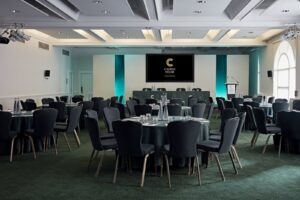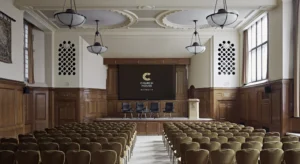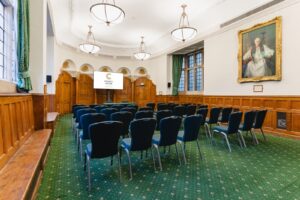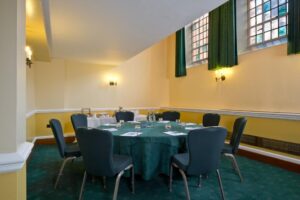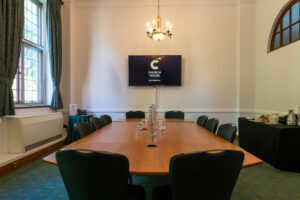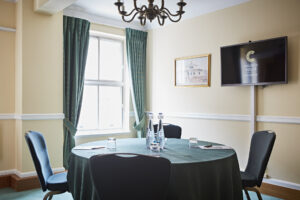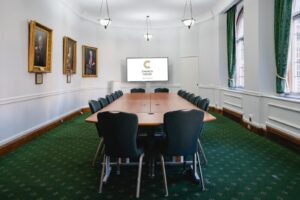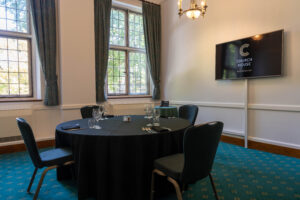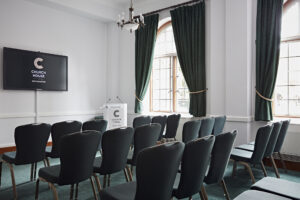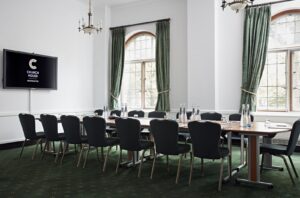Introduction
Church House Westminster is a wholly owned trading subsidiary of the Corporation of the Church House. The latter was founded as a charity in 1888 by Royal Charter.
Church House was designed to be a home for the General Synod of the Church of England. The General Synod meets up to two times a year in London and once in York.
The Royal Charter charity is managed by a board of nine trustees, known as the Council. The Council meets four times per year and holds its Annual General Meeting in July.
This policy describes the principles and procedures underpinning the letting of rooms of Church House Westminster.
Management
The board of Directors delegate to the Management of Church House Westminster, the venue, the responsibility for implementing the lettings policy and for setting the Terms and Conditions and hire charges. Venue management is responsible for determining the discounts for the Church of England bookings.
Standards
- To provide good facilities which are beneficial to the Church of England and to other users.
- To earn income to maintain Church House and to make possible grants to the work of the Church of England.
- To charge market rates so there is no positive discrimination in favour of any person or group through preferential terms with the exception of the meetings of the General Synod of the Church of England.
1. The Corporation will let its premises within the framework of the law on the usual bases of letting agreements currently prevalent for flats, offices or rooms except when:
- The hirer is known to be engaged in or promoting illegal activity.
- The hirer promotes views which are anathema to the teachings of the Church of England, as may be affirmed by its Synodical or Episcopal statement from time to time, such as groups which promote racial prejudice.
For items (c) to (h) the policy will be guided by the definition and discussion of the relevant ethical issues by the EIAG and/or the National Investing Bodies from time to time as cases arise.
- The hirer is known to be involved in the production or distribution of pornography or achieves its material revenue from the production or distribution of pornography.
- The hirer produces indiscriminate weapons1 such as nuclear weapons, chemical weapons, biological weapons or anti-personnel mines.
- The hirer derives more than 10% of its revenues from weaponry, tobacco, E-cigarettes, recreational cannabis, gambling, non-military firearms, thermal coal mining, production of oil from oil sands or high interest loans, or recreational drugs.
- The hirer is a company in which the Church of England has decided on ethical grounds not to invest, including regarding alcohol production or retail.
- The hirer derives more than 25% of its revenues from alcohol.
- The hirer is indiscriminate and/or irresponsible in seeking sponsorship from any of the above categories. In order to ensure that this is not the case, the Corporation may ask the hirer to disclose to them the criteria upon which they seek or refuse sponsorship.
1According to the understanding in International Humanitarian Law
2. This policy extends beyond monetary considerations and encompasses any arrangements or association such as partnerships, sponsorships, and hiring engagements with entities or individuals associated with industries or activities deemed incompatible with our values. This might include, but is not limited to, financial transactions, visible logos, and gifts in kind.
3. The Corporation will require written assurance from any hirer that it does not fall under any of the above categories and will offer assistance if there are matters where the hirer cannot be sure that they fall within these categories.
The following is supporting information and not part of the publicised policy.
4. Any advertising material which a hirer may wish to set up should be within the confines of the space that they have hired.
5. The Corporation will accept bookings from the following groups or for the following purposes:
- To promote social cohesion, from other faiths and marginal Christian groups for social or educational functions but not for ‘evangelism’ or propaganda purposes.
- To promote public debate, from campaigning groups except where they also promote illegal or immoral activity as defined by the Church of England through its Synodical or episcopal statements from time to time.
- Similarly, normally, from political parties which hold seats in the UK [including Scottish, Welsh or Northern Irish] parliaments/assemblies.
- To provide a venue for cultural events except where such events glorify or promote illegal or immoral behaviours as defined by the Church of England, unless it is an educational event where such material will be critiqued, and debate will occur.
6. In general, the Corporation will seek to guard against reputational risk to the Church of England or the Corporation considering Professor O’Donovan’s comments on page 2 of his paper. [see extract at end of this policy.]
The Corporation reserves the right to refuse any bookings which would be contrary to the witness and mission of the Church of England.
Notwithstanding the prohibitions above, the Corporation may allow wine and alcoholic beverages to be served in accordance with the policy of the EIAG [https://www.churchofengland.org/sites/default/files/2017-11/Alcohol%20Policy.pdf] In brief it elaborates a ‘combination of a positive view of alcohol as a gift of God with the negative condemnation of its abuse’.
Appendix
From Professor O’Donovan’s paper of 2019 offering The Corporation advice, page 2.
“When the church cooperates in evil, it compromises its witness to God’s goodness in Christ, a witness to be given by its life as well as by its teaching. Concerns about the church’s reputation derive from concern for the authenticity of its witness. One might conclude from this that reputation did not matter as such; either a bad reputation was deserved, and that was the proper thing to be concerned about, or it was not deserved, in which case willing acceptance of reproach could be a positive element in witness. “The servant is not above his master,” we are told. The church, like Jesus, may incur criticism for acting or speaking rightly; sometimes it must make discernments that are not widely understood even by its own members. Not all damage to reputation can be honestly avoided, and when accusation and counter-accusation are the daily diet of politics and journalism, there may be a strong temptation to make too high a priority of reputation for its own sake. Yet besides things we should do in the teeth of criticism and things we should not do at all there are many possible involvements neither directly required nor directly ruled out. Letting spare space in a building would be an example. In deciding on such involvements the church is free to use prudence in avoiding unnecessary occasions for criticism and confusion of its witness. To supplement the categorical prohibition of cooperation with evil, then, we may admit a second more prudential principle: the church is not bound to cooperate with any and every enterprise it does not condemn. An example of such a strategy would be the traditional bar against the clergy’s bearing arms, while lay Christians are permitted to serve in legitimate armed forces. It was not a matter of differing moral standards, but (as Canon C26 expresses it, more generally) of “such occupations…as do not befit (the) sacred calling”. There is a symbolic and communicative appropriateness if those with a special calling to preach God’s overthrowing of fear and ordering of peace for mankind do not to assume the role of armed defenders of earthly political order.”
Updated September 2024

